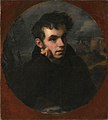Golden Age of Russian Poetry (or Age of Pushkin) is the name traditionally applied by philologists to the first half of the 19th century. [1] This characterization was first used by the critic Peter Pletnev in 1824 who dubbed the epoch "the Golden Age of Russian Literature." [2]
Poets
The most significant Russian poet Pushkin (in Nabokov's words, the greatest poet this world was blessed with since the time of Shakespeare [3]) and some scholars even refer to this period as the "Age of Pushkin". [2] Mikhail Lermontov and Fyodor Tyutchev are generally regarded as two most important Romantic poets after Pushkin. [4] Other poets include Pyotr Vyazemsky, Anton Delvig, Kondraty Ryleyev, Vasily Zhukovsky and Konstantin Batyushkov. Pushkin himself, however, considered Evgeny Baratynsky to be the finest poet of his day.[ citation needed]
References
- ^ John, Gary (2009-08-07). "LESSON 4 The Golden Age: Aleksandr Pushkin". Department of Slavic and Central Asian Languages , University of Minnesota. Retrieved 2012-03-23.
- ^ a b Khitrova, Daria (2019). Lyric Complicity: Poetry and Readers in the Golden Age of Russian Literature. University of Wisconsin Press.
- ^ Boyd, Brian (2011). Stalking Nabokov: Selected Essays. New York: Columbia University Press. p. 203. ISBN 978-0231158565.
- ^ Nabokov, Vladimir (1944). Three Russian Poets: Selections from Pushkin, Lermontov, and Tyutchev. New York: Norfolk: New Directions.
See also



